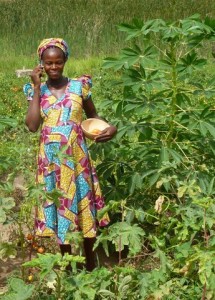Sean Krepp, Country Director Grameen Foundation Uganda
ReadySet™ Charging Phones
Building a power company that serves the rural Ugandan poor is a tall order. Rural small holder farmers may live miles from the nearest road or power line. Access to steady power, something we take for granted, is a fundamental concern for the rural poor as they seek to charge their phones or study at night. Recently we’ve been fortunate to work with Mike Lin, an American entrepreneur and founder of the renewable energy company Fenix International. Fenix is a different kind of power company. It doesn’t build grids or power plants, but instead they manufacture a “power hub” that is charged by solar, mains power, or even a bicycle. The power hub, called a ReadySet™, empowers an individual to become a micro-utilities provider by recharging phones, running lights at night, or even powering electric clippers for the village barber.
The ReadySet™ is particularly useful for our Community Knowledge Workers (CKWs) as they have a steady demand for power to charge the smartphones they use to dispense agricultural information to their neighbors. In the past, we had equipped CKWs with car batteries to use as recharging stations. These batteries were limited in the amount of recharges they provided and their constant need for maintenance. The ReadySet™ solves both of these problems – in fact one of our CKWs who tested the ReadySet™ reported he went from charging five phones per week (including his own) to 25 phones per week. At 500 Uganda Shillings per charge, this 5x increase represents a substantial new income stream for him and more dependable provision of his services to farmers for us.
The 15W solar panel charges the ReadySet in approximately 6hrs of full sunlight.
The spirit of empowering entrepreneurship is also reflected in the origins of Fenix Intl and the ReadySet™ unit. Mike came to us as a volunteer in the early days of Grameen Foundation’s AppLab Uganda when we were predominately working with SMS but had begun to discuss using smartphones. He was immediately struck by the power problem.
“When we were testing the first Android G1s, we struggled to keep the phones charged”, recalls Mike. “This challenge sparked the idea that an entrepreneur could create a sustainable business by charging phones and providing power to their communities.”
After his volunteer commitment was up he continued to work on the problem, developed prototypes, and returned several times to AppLab Uganda to test his work. We’re glad that the ReadySet™ is now in production and that we are Fenix Intl’s first commercial customers. Congrats Mike!


